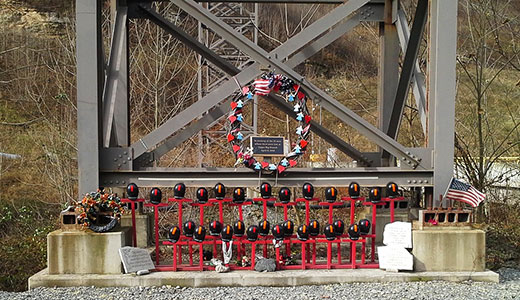
BECKLEY, W. Va. – On Monday, April 5, 2010, an explosion rocked Massey Energy’s Upper Big Branch Mine, killing 29 miners who were working underground at the time. The mine is located in Montcoal, W. Va. (near Whitesville) in the northwest corner of Raleigh County, West Virginia. Its entrance is beside a small stretch of road, nestled in a narrow holler along a small creek between two tall hillsides. In that dreary valley is where the nation’s deadliest explosion since 1984 took place, killing 29 miners.
The disaster and the resulting deaths shocked the mining communities of Raleigh and Boone Counties in southern West Virginia’s Appalachian Mountains. It also left the dead miners’ families grieving as they gaze at the door through which a father, husband, or son shall never pass again.
The holidays will be bleak this year for those families as they sit down to Christmas dinner-if there is one. As the family gathers around the table, a chair will stand vacant-Daddy’s chair. Tears will come as a wife glances at the couch where her husband used to doze after a hard day’s work.
A mother may stop to wipe her eyes as she, out of habit, starts to set a place at the table where her dear son used to sit.
The possible loss of a loved one in the mines is something that every West Virginia coal mining family has come to accept. Although steeled to the dangers inherent in coal mining, there is no balm, except perhaps time and justice, that can assuage the grief, pain, and loss that a miner’s family must suffer-especially when their loss is caused by a coal company’s deliberate negligence in their greed for ever greater profits.
The question that now faces those grieving families is whether there will be some sort of reckoning. Will those responsible for their loved ones’ deaths ever be made to answer before the law their actions and negligence? As the case against Don Blankenship, former CEO of Massey Energy, slowly proceeded from court hearing to hearing, the deceased miners’ families crowded into the courtroom, seeking answers to that very question.
The latest chapters in the Blankenship saga unfolded this month when, on Nov. 13, a federal grand jury indicted Blankenship on four criminal counts: Conspiracy to violate mandatory mine safety and health standards, Conspiracy to impede mine safety officials, Making false statements to the U.S. Securities and Exchange Commission, and Securities fraud. The safety violations for which Blankenship stands charged are believed to have caused a build up of highly combustible methane gas, leading to the explosion that killed those 29 miners. If Blankenship is convicted on all of the charges he could spend up to 31 years in prison.
Blankenship was scheduled to be arraigned at 1:00 pm and have a bond hearing at 2:00 pm on Nov. 20. His attorneys, however, attempted to delay justice by requesting a postponement of both hearings. The families did receive a bit of justice on the 19th when Blankenship’s request for a postponement was denied. They got even more good news the next day when Magistrate R. Clarke VanDervort denied Blankenship’s request to be released on his own recognizance.
At the Nov. 20 hearing, Eric Delinsky, one of Mr. Blankenship’s attorneys, argued that his client should be released on a personal recognizance bond by citing Blankenship’s deep roots in southern West Virginia as proof that he’ll appear for upcoming hearings. Delinsky made the usual defense claim that, his client is innocent (to which assistant U.S. attorney, Steve Ruby, expressed confidence that the evidence strongly supports the state’s case against Blankenship). Magistrate VanDervort apparently was not so trusting of Blankenship’s ties to the community and imposed a $5 million cash-only bond, subject to forfeiture should Blankenship abscond.
The date for Blankenship’s pre-trial hearing is set for 1:00 pm on Jan. 6 and all pre-trial motions are ordered to be submitted by no later than Dec. 30. The trial itself is set to begin at 9:00am on Jan. 26 before U.S. district judge, Irene Berger in Beckley federal court.
Photo: Roadside memorial showing all 29 miner helmets. John Miliam/PW












Comments